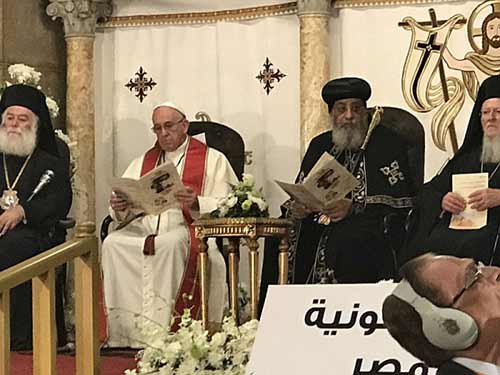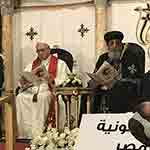
The image above, of three popes and a patriarch (no it’s not the beginning of a joke), may be unique in Christian history.
The Copts have been separate from majority Christianity since the Council of Chalcedon in A.D. 451, the fourth ecumenical council. Pope Francis (for the Roman Catholic Church) and Pope Tawadros II (for the Coptic Church) signed a joint statement of full acceptance of each other’s baptism, that they would work to produce agreed translations of the Lord’s Prayer, and seek to celebrate Easter on the same day:
Let us deepen our shared roots in the one apostolic faith by praying together and by seeking common translations of the Lord’s Prayer and a common date for the celebration of Easter….
Today we, Pope Francis and Pope Tawadros II, in order to please the heart of the Lord Jesus, as well as that of our sons and daughters in the faith, mutually declare that we, with one mind and heart, will seek sincerely not to repeat the baptism that has been administered in either of our Churches for any person who wishes to join the other.
The Coptic/Chalcedonian divide is not about the nature of the Trinity (which lies at the heart of baptism). It is about the nature of Jesus’ divinity and humanity:
The Coptic understanding is that Christ is one nature from two natures: “the Logos Incarnate.” In this understanding, Christ is from, not in, two natures: full humanity and full divinity. Some in the Coptic Orthodox Church believe that their position was misunderstood at the Council of Chalcedon and take great pains to ensure that they are not seen as Monophysitic (denying the two natures of Christ), but rather “Miaphysitic” (believing in one composite/conjoined nature from two). Some believe that perhaps the council understood the church correctly, but wanted to exile the church for its refusal to take part in politics or due to the rivalry between the bishops of Alexandria and Rome.
I posit that many (most?) Christians would not be able to articulate (or debate) the faith that Chalcedon expressed:
we all with one voice teach the confession of one and the same Son, our Lord Jesus Christ: the same perfect in divinity and perfect in humanity, the same truly God and truly man, of a rational soul and a body; consubstantial with the Father as regards his divinity, and the same consubstantial with us as regards his humanity; like us in all respects except for sin; begotten before the ages from the Father as regards his divinity, and in the last days the same for us and for our salvation from Mary, the virgin God-bearer as regards his humanity; one and the same Christ, Son, Lord, only-begotten, acknowledged in two natures which undergo no confusion, no change, no division, no separation; at no point was the difference between the natures taken away through the union, but rather the property of both natures is preserved and comes together into a single person and a single subsistent being; he is not parted or divided into two persons, but is one and the same only-begotten Son, God, Word, Lord Jesus Christ, just as the prophets taught from the beginning about him, and as the Lord Jesus Christ himself instructed us, and as the creed of the fathers handed it down to us.
Thanks to Orthodox Deacon Steve Hayes for the above image, and you can read more at his article here. My favourite comment I saw about the above image: “Looking for all the world like they’re waiting in a doctor’s office, thumbing through old magazines.”
If you appreciated this post, do remember to like the liturgy facebook page, use the RSS feed, and signing up for a not-very-often email, …




We are edging closer to unity …!
It only took 1600 years.
I would agree with your position. I certainly can’t articulate, debate, or really manage to slog through the language from the Council. Perhaps if they wrote it on the head of a pin an Angel could diagram it for me? :o)
Thanks again for another interesting read. Thoughtful and thought-provoking. Appreciate it.
Thanks for your encouragement, Stephen. Easter Season Blessings!
The idea of a common Easter date frightens me. What could be desirable is that in the one same country, where different Churches are present, there only be one Easter (as in Greece or in Finland).
Thanks, George. Isn’t that what a common Easter date means? Easter Season Blessings.